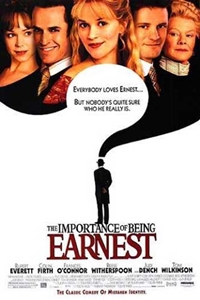The Importance of Being Earnest (PG) ★★½
 Truthful revelations finally save two eligible London bachelors, who get tripped up by lies and upper-class superficialities in the late 19th century at a lavish country cottage where the young society ladies they hope to marry and the insufferably snobbish mother they hope to avoid have also convened.
Truthful revelations finally save two eligible London bachelors, who get tripped up by lies and upper-class superficialities in the late 19th century at a lavish country cottage where the young society ladies they hope to marry and the insufferably snobbish mother they hope to avoid have also convened.
Story
London bachelor John (Jack) Worthing, who has a murky background, and his roguish, spendthrift friend Algernon (Algy) Moncrieff pursue romance but are each deceitful in their own ways. Jack, who is guardian of his beloved niece Cecily Cardew at an estate outside London, invents a brother named Ernest so he can escape to London whenever the whim hits and hook up with pal Algy. Both bachelors are suitors, but their lies and the rampant snobbery of the day get in the way. Jack hopes to marry Gwendolen Fairfax, but her rigidly elitist and dominating mother, Lady Bracknell, is put off by Jack's lowly origins. (Parents unknown, he was found as a package at Victoria Station.) While Jack locks horns with Bracknell in London, Algy journeys to Jack's country home to woo Cecily and gains entree by claiming to be Ernest, Jack's invented brother. When Jack returns to the country to announce that the fictive Ernest is dead, he must confront pal Algy, who has successfully re-invented himself as Ernest, and a host of deceits. But delicious revelations unleashed by the devoted nanny-turned-tutor Miss Prism save the day for both fib-prone suitors. Happily, Cecily and Gwendolen share their suitors' romantic inclinations and tolerance for tall tales.
Acting
The burning question in many minds is, no doubt, whether Reese Witherspoon (Legally Blonde), the only American in this veddy Brit film, can carry an English accent. The answer is a resounding ''yes.'' Her success as privileged ingenue Cecily, in both accent and overall performance, is all the more commendable because she is surrounded by some of the brightest and best of Brit acting talent. Colin Firth as Jack and Rupert Everett as Algy are seductively charming and appealing as the spoiled, but smitten, bachelors. Frances O'Connor as Gwendolyn convinces as the very ''upper,'' but rebellious, daughter of the imperious Lady Bracknell. And Dame Judi Dench as the formidably snotty and harsh Bracknell is scary enough for a horror film. Tom Wilkinson, recently nominated for his role in In the Bedroom, is appropriately genteel as the clergyman with a soft spot for Miss Prism, sweetly portrayed by vet English actress Anna Massey, brother of Donald and daughter of Raymond, both legendary thesps. Art house fans will most appreciate the fine cast that, armed with Wilde's words and ideas, valiantly battles the film's excesses in a mission to entertain. As a dream ensemble, they help put across Wilde's amusing story of mistaken identity, naughty habits and laughable upper-crust foibles.
Direction
Oliver Parker was obviously on a shorter leash when he earlier directed his more disciplined and faithful adaptation of another Oscar Wilde play, An Ideal Husband. With Earnest, Parker has gone auteur with a fury by crafting a bloated, overproduced, extravagantly opened-up version of the concise play that Wilde would hardly recognize. Here, the lavish costumes, sumptuous sets, overbearing musical soundtrack and Parker-invented flights into fantasy (Cecily has recurrent daydreams of a white knight coming to the rescue) and flashback (Bracknell has a Parker-minted, lowly-dance-hall chorine past) all but drown out Wilde's streamlined savage wit and whack at upper-class conceits. Still, Parker allows his illustrious performers to shine through all the fluffery.
Bottom Line
Oliver Parker's overstuffed, lavish adaptation of Oscar Wilde's classic play, The Importance of Being Earnest, manages to survive as the brilliant satire of the superficiality and silliness of turn-of-the-last-century upper-class Brits that Wilde meant it to be.
To get the full Quicklook Films experience, uncheck "Enable on this Site" from Adblock Plus
box office top 10

Civil War Released: April 12, 2024 Cast: Kirsten Dunst, Wagner Moura 11.1M

Abigail Released: April 19, 2024 Cast: Melissa Barrera, Dan Stevens 10.2M

Godzilla x Kong: The New Empire Released: March 29, 2024 Cast: Rebecca Hall, Brian Tyree Henry 9.5M

The Ministry of Ungentlemanly Warfare Released: April 19, 2024 Cast: Henry Cavill, Eiza Gonzalez 9M

Spy x Family Code: White Released: April 19, 2024 Cast: Takuya Eguchi, Saori Hayami 4.9M

Kung Fu Panda 4 Released: March 8, 2024 Cast: Jack Black, Viola Davis 4.6M

Ghostbusters: Frozen Empire Released: March 22, 2024 Cast: Paul Rudd, Carrie Coon 4.4M

Dune: Part Two Released: March 1, 2024 Cast: Timothée Chalamet, Rebecca Ferguson 2.9M

Monkey Man Released: April 5, 2024 Cast: Dev Patel, Sikandar Kher 2.2M

The First Omen Released: April 5, 2024 Cast: Nell Tiger Free, Bill Nighy 1.7M






